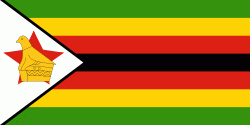Shona language
Shona (chiShona) is a Bantu language of the Shona people of Zimbabwe. It was codified by the colonial government in the 1950s. According to Ethnologue, Shona, comprising the Zezuru, Korekore and Karanga dialects, is spoken by about 6 .5 million people. The Manyika dialect of Shona is listed separately by Ethnologue, and is spoken by 1,025,000 people.
The larger group of historically related languages—called Shona languages by linguists—also includes Ndau (Eastern Shona) and Kalanga (Western Shona).
Shona is a written standard language with an orthography and grammar that was codified during the early 20th century and fixed in the 1950s. In the 1920s, the Rhodesian administration was faced with the challenge of preparing schoolbooks and other materials in the various languages and dialects and requested the recommendation of South African linguist Clement Doke.
The first novel in Shona, Solomon Mutswairo's Feso, was published in 1957. Shona is taught in the schools, but is not the general medium of instruction in other subjects. It has a literature and is described through monolingual and bilingual dictionaries (chiefly Shona – English). Standard Shona is based on the dialect spoken by the Karanga people of Masvingo Province, the region around Great Zimbabwe, and Zezuru people of central and northern Zimbabwe. However, all Shona dialects are officially considered to be of equal significance and are taught in local schools.
The larger group of historically related languages—called Shona languages by linguists—also includes Ndau (Eastern Shona) and Kalanga (Western Shona).
Shona is a written standard language with an orthography and grammar that was codified during the early 20th century and fixed in the 1950s. In the 1920s, the Rhodesian administration was faced with the challenge of preparing schoolbooks and other materials in the various languages and dialects and requested the recommendation of South African linguist Clement Doke.
The first novel in Shona, Solomon Mutswairo's Feso, was published in 1957. Shona is taught in the schools, but is not the general medium of instruction in other subjects. It has a literature and is described through monolingual and bilingual dictionaries (chiefly Shona – English). Standard Shona is based on the dialect spoken by the Karanga people of Masvingo Province, the region around Great Zimbabwe, and Zezuru people of central and northern Zimbabwe. However, all Shona dialects are officially considered to be of equal significance and are taught in local schools.
Country
-
Zimbabwe
Zimbabwe, officially the Republic of Zimbabwe, is a landlocked country in Southern Africa, between the Zambezi and Limpopo Rivers, bordered by South Africa to the south, Botswana to the south-west, Zambia to the north, and Mozambique to the east. The capital and largest city is Harare. The second largest city is Bulawayo. A country of roughly 15 million people, Zimbabwe has 16 official languages, with English, Shona, and Ndebele the most common. Beginning in the 9th century, during its late Iron Age, the Bantu people (who would become the ethnic Shona) built the city-state of Great Zimbabwe; the city-state became one of the major African trade centres by the 11th century, controlling the gold, ivory and copper trades with the Swahili coast, which were connected to Arab and Indian states. By the mid 15th century, the city-state had been abandoned. From there, the Kingdom of Zimbabwe was established, followed by the Rozvi and Mutapa empires.
The British South Africa Company of Cecil Rhodes demarcated the Rhodesia region in 1890 when they conquered Mashonaland and later in 1893 Matabeleland after a fierce resistance by Matabele people known as the First Matabele War. Company rule ended in 1923 with the establishment of Southern Rhodesia as a self-governing British colony. In 1965, the white minority government unilaterally declared independence as Rhodesia. The state endured international isolation and a 15-year guerrilla war with black nationalist forces; this culminated in a peace agreement that established universal enfranchisement and de jure sovereignty as Zimbabwe in April 1980. Zimbabwe then joined the Commonwealth of Nations, from which it was suspended in 2002 for breaches of international law by its government under Robert Mugabe and from which it withdrew in December 2003.
